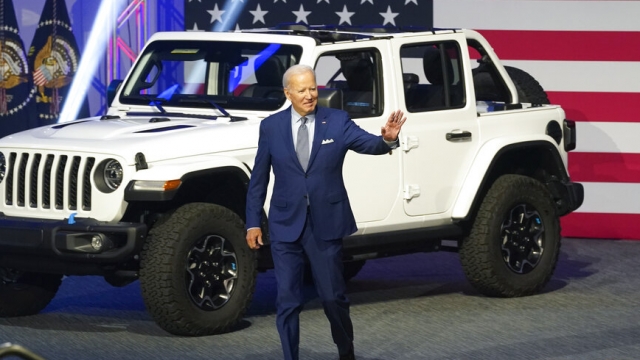The United Auto Workers have told General Motors, Ford and Stellantis that if they don't get a deal with improved wages by 11:59 Thursday night, union members are prepared to strike—at least partially to start.
On Thursday night General Motors, Ford and Stellantis had made some concessions on wages, but had not agreed to other demands from the union.
The strike would immediately impact car manufacturing in the United States and potentially the overall economy if it lasts for an extended period of time.
Strikes in history
A nationwide UAW strike wouldn't be the first. The 1940s saw multiple strikes by the union. The 1970s had some of the most consequential auto worker strikes in history.
2007's UAW strike ushered in many changes, like 401(k) plans for new employees rather than defined pensions, which the UAW wants changed again.
However, the politics of all of this are a bit complicated in 2023.
Typically, the union has been in lockstep with Democrats, endorsing President Joe Biden in 2020 and countless other Democrats throughout the last 100 years. In return, Democrats have typically stood by auto workers and many of their demands during work stoppages.
However, UAW President Shawn Fain has yet to endorse a candidate for president in 2024. Most major unions have already endorsed President Biden.
"Our endorsements are going to be earned, not freely given," Fain said on CNN this past week.
SEE MORE: What impact would a UAW strike have on the US economy?
One major issue is electric vehicles, a policy pushed by the White House.
Ford CEO Jim Farley said last year that EVs will eventually require 40% less labor to build than traditional cars. The UAW has criticized Democrats in Washington for handing out EV battery-building contracts to states with low union membership.
"We have a lot of issues we need to resolve; there is a lot with the EV transition that has to happen," Fain said on CNN.
The EV divide puts the White House in a potentially tough political spot.
Standing by the auto workers in a possible strike could potentially put the president against his own EV policies. Not standing by them entirely could potentially cost him an endorsement.
President Biden routinely refers to himself as the most pro-union president in history.
Former President Donald Trump, meanwhile, is attempting to use this to his advantage. Pew Research recently found that 4 in 10 Americans are at least somewhat interested in buying electric cars.
SEE MORE: What is the state of unions in the US?
"What's happening to our auto workers is an absolute disgrace and outrage beyond belief," Trump said in a Sept. 4 social media post.
"These people are allowing this country to do these electric vehicles that very few people want," Trump added.
As for the White House, their involvement in a hypothetical strike is unclear. Independent economists have said a 10-day strike could cost the U.S. economy over $5 billion.
"He believes that auto workers deserve a contract that sustains middle-class jobs," Jared Bernstein, the chairman of the Council of Economic Advisors, said Wednesday about President Biden and a possible strike.
Trending stories at Scrippsnews.com



